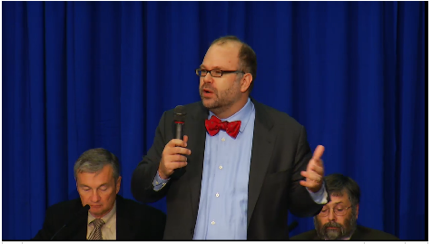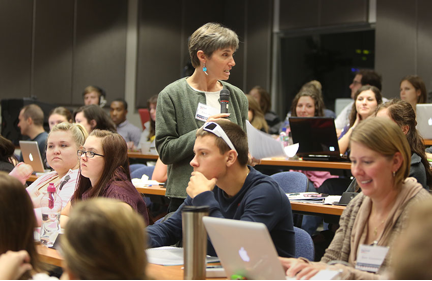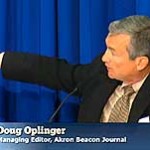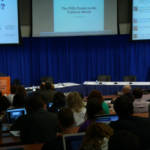Blog:
Ten hot ethical challenges facing political reporting in 2012


“The values of journalism are under pressure.” With that remark, Kelly McBride of The Poynter Institute set the stage for “Dirty Politics,” the 2012 ethics workshop at Kent State University.
Here are ten hot ethical challenges in political coverage that emerged from the workshop. Join in the series of online conversations exploring ways to handle them. Bring your questions! Bring your experience! Help uncover ethical issues in political coverage that require clarity to provide the accurate reporting people deserve to inform their vote.
Quote approval easily made the hot topics list from last week’s Poynter Kent State media ethics workshop. Gregory Korte told the crowd there he suffered culture shock when he moved to D.C. two years ago to join USA Today. Only once in his career had anyone asked him to change a quote (the mayor of Akron wanted to take back a “goddamn”). In Washington, he says don’t-quote-me-this-is-on-background is where most conversations begin. He even once received a press release from a Senator’s office marked both “for immediate release” and “off the record.”
Korte makes it clear the tradeoffs of getting access to people in power sometimes get out of hand. Check out the ongoing online conversation with Gregory Korte: How do you manage the ethical minefields of access journalism?
The year of the fact-checker?
Is 2012 becoming “the year of the fact-checker?” Bill Adair, founder of PolitiFact, told the crowd at the 2012 Poynter Kent State Media Ethics Workshop that the five-year-old project has changed the system. Campaigns, he said are now being asked to explain “what the fact-checkers say.” Some ethical questions: what are the best ways to call out wrong facts in publications or interviews? And this from @KyleBruinoka: Is there or should there be any body to fact check the fact checkers?
The other nine on the Hot Ten list:
- Social Accountability: What questions should you ask yourself before you tweet a contentious political bite? With the growing pressure to build a personal brand and engage authentically, how much of yourself is strategic to reveal across your personal and professional networks? How do you contextualize memes, trendings and likes in your reporting? How do you respond when your work is characterized in a way not consistent with its intent? Google’s Kamau Bobb shapes the discourse on the future of education with a focus on adaptability and innovation.
- Digital and visual: How can you be sure your cool data visualizations don’t oversimplify? What are the best ways to aggregate information without plagiarizing or generalizing? What are important ethical guidelines when you’re editing politically potent video? What about when you’re reporting on potentially unethically edited clips?
- Transparency and privacy: With the growing expectation that anything politicians say in public could instantly spread around the world, are journalists always obliged to identify themselves as reporters? What, if anything, should still be considered private to a candidate or official?
- Neutrality: This concept is on the way out, but the recognition that we all carry assumptions is in. How do you learn what biases you bring to a story? What do you do with that knowledge? How do you know if it’s affecting your reporting?
- Fact-checking: Bill Adair, the “father of Politifact,” told the ethics conference that 2012 is becoming the year of the fact-checker. What are the best practices for journalists to call out misconstrued facts, or outright lies, in reporting and while interviewing? What are the best ways for the public to hold reporters accountable? Should TV stations reveal how much money they earn from political ads? Should they refuse to air ads that make untrue claims? What are the best ways to get away from he said/she said journalism?
- Covering polls: Many political reports mention the margin of error pollsters identify in their own work, but what other best practices can help put horserace numbers in the right context? Should there be a standard ranking of the value of different polls based on what information the pollsters are willing to release?
- Inclusion and representation: If “feminism is way more volatile for a lot of people than ‘liberal’,” as Pulitzer prize-winning columnist Connie Schultz told the Poynter Kent State workshop crowd, should political sources quoted roughly match the gender and racial balance among the electorate, or among those in power? If you want to broaden the range of sources you speak to, what are smart ways to start?

- The basics of political reporting: What are the unique aspects of political reporting that demand particular ethical considerations? At the workshop, Akron Beacon Journal reporter Stephanie Warsmith listed the basic responsibilities: Report what’s happening, explain what’s happening, hold elected officials accountable, educate and entertain. Is there a bottom-line mission worth hammering out?
- Making the system better: What guidelines might combine the best of both the Fourth and Fifth Estates? Should journalists actively press to change any laws, such as those that might make tracking campaign money easier? Are there ways to report or write that will encourage people, or candidates, to be civil, even in emotional disagreements? Is there an ethical obligation to make political coverage directly relevant to your audiences’ lives? Is there an ethical mandate to understand the public’s needs and force politicians to respond?
Growing out of the Poynter Kent State ethics workshop, the JA is hosting a series of online conversations on key ethical issues in political coverage that deserve guidance. What journalism practices do you think are essential to deliver the election coverage that people deserve?










Weigh In: Remember to refresh often to see latest comments!
1 comment so far.
Cultivating a culture of contention is an ethical breach I believe should make this list. Would there be a need for Politifact if journalists were doing their homework and following up interview questions with facts that refuted distortions and factual errors uttered by elected officials and candidates? Shouldn’t media BE the fact-checkers that Politifact was created to be? It seems apparent that either journalists are in such a rush to run with quotes of any variety from a newsmaker’s mouth that they parrot most anything and unwittingly become the purveyors of public putrescence or they willingly engage in cultivating a culture of contention that creates the caustic political environment the electorate complains about each campaign cycle.
Is it a worthwhile idea for a media platform to emerge that seeks to interview every candidate on his or her true understanding of the political opposition’s platforms and policies, and then rate that candidate accordingly? Such a standardized practice would seek to get every candidate and incumbent on record expressing their knowledge of their opposition’s actual position, as reviewed and graded by that opposition.